Talking About Detroit - Interviews And Photos By Alex M. Franquet
Francisco Frank Garcia has always been in touch with music
The Music Society of Detroit works to give the artists the recognition they deserve by Alex M. Franquet.
When I started having contacts in Detroit my goal was to try to contact as many of the original artists I could to make sure their story could be told. At the start, it was not easy, but finally Francisco Frank Garcia II helped me with the investigation and the result is this series of interviews and conversations with Barbara Mercer, Carlis "Sonny" Munro from The Falcons, D'Y-Ann Marie Mathis from the Debonaires , Calvin "Dhaakk" Stephenson from the Magic Tones and Joey Kingfish. They are preparing themselves for a possible English and European tour and they will be delighted to be in touch with promoters.
Francisco Frank Garcia II.
The Music Society of Detroit was founded in 1993 and Francisco Frank Garcia II became the president, with other board members like Emanuel Laskey, The Dynamics, Barbara Mercer, Steve Mancha, Melvin Davids, Pat Lewis or Betty Lavette. Now, more than 10 years later, Frank Garcia is still a man with a mission. In 1993, the Music Society was fighting for recognition to the legacy of the Detroit soul artists and now the fight it's still going on.
It's important to ask Frank Garcia if the Music Society of Detroit has achieved yet all the goals that had at the start, if the artists are happier now with their situation: royalties, recognition for their careers, new gigs and new opportunities. "There have been new opportunities generated for the Society artists. However, we've been waiting eight years for an audit of our individual accounts with BMI. So, no, we haven't accomplished all of our goals until everyone is paid".
Recently, Frank Garcia has been inducted into the Motown Records Hall of Fame, along with Mike Terry and Popcorn Wylie. But this recognition to his task doesn't fullfill him. "I appreciate that recognition, but I have too much work to do rather than bask in the glow of world wide recognition. Until all Detroit artists are paid, my job is only half done".
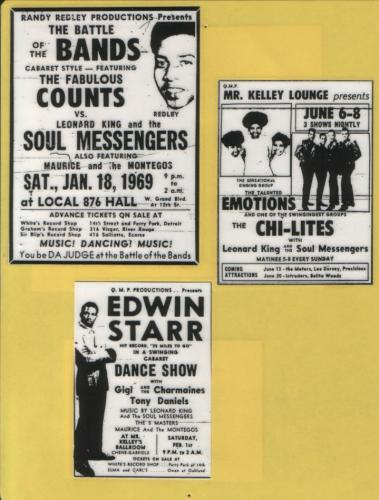
One of the Music Society tasks it has been to prepare those Goldmine CD's with Detroit demos that were issued a couple of years ago. We are talking about "The Lost soul of Detroit", "Detroit soul from the vaults, vol. 1 & 2", "Parliaments: I wanna testify", "The Thelma Records story", "The Groovesville Collection", the Solid Hit ones and others. He researched tapes, masters and demo and transferred them into DAT for the Goldmine CD's to be done.
Frank Garcia included a song he had cut in the sixties in the compilation "Detroit Soul from the Vaults Vol 2.". It was a cover of "I've got the feeling". The vocals were re-recorded by him, but the musical backing was the same. The musicians who played on that song were the cream of Detroit: Joe Hunter (piano), Uriel Jones (drums), Mike Terry on sax, Don White on trombone, Dave Hamilton (vibes), Bob Babbit on bass. The guitarist session men line up is impressive: Joey Kingfish, Eddie Willis and Dennis Coffey. Jack Ashford played percussion. Don Davis, Rose McCoy and Gene Read were the producers. It was recorded at Terra Shirma studios, owned by brothers Russ and Nick Terrana.
Now, another main goal to archive by the Music Society of Detroit is touring around England and Europe. So, all propositions by English promoters are well received and will be studied.
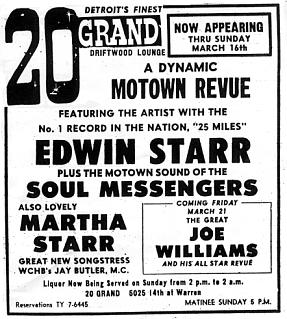
In fact, Francisco Frank Garcia has always been in touch with music. "My Mom was a professional singer on radio and my Dad was a professional dancer. My Mom's youngest brother attended Technical High School with jazz guitarrist Kenny Burrell. My parents would have parties and barbecues on the weekends and my uncle would invite some of his closest friends: Miles Davis, Sarah Vaughn, Billy Eckstein, Ella Fitzgerald, Joe Williams and others. Even Billie Holliday showed up once".
His memories of those early days are very clear: "I was 3 years old and my uncle and friends would pay me to sing Sarah Vaughn's "Broken hearted melody". It's easy to understand that he took music lessons in violin, viola, cello and bass.
In 1966 he played with The Perceptions on songs like "Shuckin and jivin" (written by him) or a cover of Cannonball Adderley "Jazz samba" that were recorded but never issued. Are the masters available? "No", he says disappointed, "the songs were produced by the late jazz harpist Dorothy Ashby. She passed away some years ago, so I have no idea about what happened to the masters. However, there were three demos recorded, one of which I have kept all these years. I have no idea what happened to the two additional copies".
He was offered to play bass in Leonard King and the Soul Messengers because they had been friends since they went to kindergarten together. "Leonard began playing drums around the same time I began playing the up-right bass. In 1966 he asked me to join the Soul Messengers, that were formerly The Jazz Septet and originally The Kings of Rhythm. His brothers were at the band Gregory was on sax and Atiba (Larry) on trumpet.
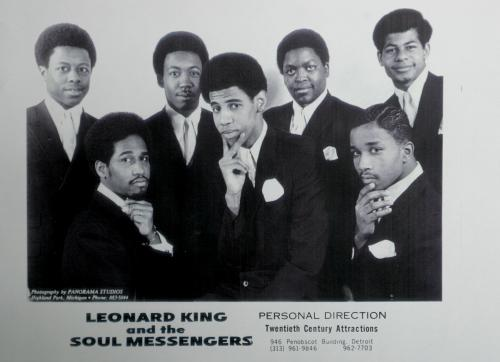
(You can find more information about Leonard King on his website http://www.leonardkingdrums.com)
The band provided backup to a lot of acts in Detroit clubs around 1968-69. The list is endless: O'Jays, Al Green, Chi-Lites, Emotions, Johnny Taylor, Bobby Bland, The Intruders, Archie Bell and the Drells, The Delphonics, The Spinners, The Originals, Edwin Starr, JJ Barnes, Dramatics, The Superlatives, The Fantastic Four, Detroit Emeralds, Louis Curry, Tony Daniels, The Metros, The Precisions, The Magic-Tones, The Fabulous Peps, Lee Rogers, Dee Edwards, Johnny Mae Matthews, Gigi and the Charmaines, Andrea Henry, Spyder Turner...
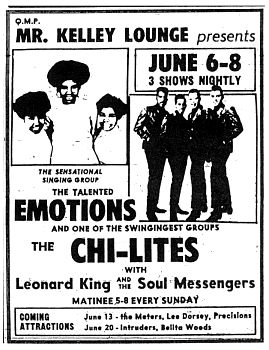
You will see that they played for a Chicago band like The Chi-Lites, and they had a good relation. "The group was a lot of fun to be with", Frank Garcia remembers, "Marshal was always clonning and telling jokes. Eugene Record and I passed for brothers because we looked so much alike".
In 1968, Leonard King and the Soul Messengers had a single on the Harry Balk label Impact. You know it well: "The Barracuda". Garcia explains us that "the song was originally recorded by jazz pianist Monty Alexander. The original name of the song was "Spunky". We basically kept everything the same except the horns, as there were no horns on the original recording".
"The Barracuda recording session was great. We recorded a total of seven songs of which only two were ever released and the song sold very well in the Detroit area".
Garcia was a usual visitor to United Sound and he remembers that the atmosphere there "was charged with energy. There was a strong atmosphere of cooperation and everyone's creative juices were flowing".
With so many singers and musicians there, I'm sure that something funny must have happened there sometime at the United Sound Studios. Frank Garcia confirms my theory because he remembers "one time that The Dramatics, The Holidays and The Metros were all booked at the same time. Now that was funny!", he laughs.
In 1969 he worked at the Gloria Taylor recordings for the "Silver Fox" label from the South of the States. "I had never seen the South and I needed a change. It was a good learning experience.
There, he had a record as The Brightlights with the song "Motor City Funk". "I remember the wives and girlfriends of the Muscle Shoals musicians doing the background on the tracks. To be honest, they talked, not sang. The Muscle Shoals band asked me to join them as a permanent basis but I turned down the offer because in 1969 the South was not prepared to deal with a northern political activist like myself".
Around that time he had a close relation with Motown's David Ruffin and was his musical director on "My Whole World Ended The Moment You Left Me". That brings us to the relation between Motown and the other Detroit artists. Garcia denies Motown being hated. "Detroit musicians never hated Motown. In fact, we all made money with them, but we didn't particulary care for Berry Gordy's policy of recording and perfoming exclusively with Motown".
At the early seventies he worked at "Soul Hawk Records" for Richard "Popcorn" Wylie and there he met the late Tony Hester. "Tony was a gentle, sensitive person who could write lyrics on any track Popcorn gave him and turn it into a hit. I still miss him and Jimmy Soul Clark".
Emanuel Laskey.
Emanuel Laskey, of "Peace loving man" and Thelma Records fame, started the Music Society with Frank Garcia in 1993 but now he is not sure what Emanuel is doing these days. "I only know that he has hired the services of an attorney in an attempt to help him recover royalties from the song "Welfare cheese" for which he was never compensated".
Soul Messengers CD.
Astro Chemistry Records & Filmworks, a company founded by Frank Garcia, is working to secure the rights of a sixties live recording by The Soul Messengers. It's going to be called "The Soul Messengers: Live at The Chit Chat Lounge", but Garcia first has to secure the rights to all songs performed by The Soul Messengers.
Carlis "Sonny" Munro (from The Falcons).
"My inspiration for writing "Has it happened to you yet" was a cigarettes commercial".
Sonny Munro, of The Falcons fame, became interested in music because of his mother, she told him how to sing and gave him his first classes. "She was instrumental in me becoming interested in music. Also, my love for singers like Nat King Cole, Jackie Wilson and Clyde McPhatter".
Later, in the sixties, he was able to meet some of his personal heroes, like Jackie Wilson. "We, The Falcons, appeard with Jackie Wilson in Fort Lauderdale, Florida. Jackie and myself met in his dressing room. I remember well that he waisted a few drops of a drink on his suit and changed. Afterwards, we had a conversation about our resemblace and we laughed at the world. He was very special. One of the greats".
Prior to being with the Falcons he was with a pair of groups. The Ramblers were Frank Holt, Johnny Alvin, James Gibson and himself. It was his debut and they recorded a disc on Federal.
Now he remembers that "later, my next band, The Fabulous Playboys sounded more adult and Daco Records, with Don Davis, allowed us national distribution while being able to continue to perform in Detroit until we met Robert West at his studio and he designated The Playboys to become The Falcons because the original Falcons had broke up. It was good for us".
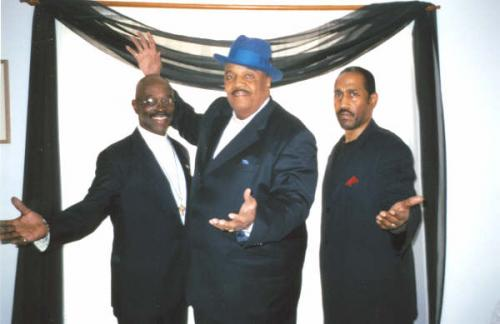
With this new formation they appeared on november 1963 at the Apollo with Doris Troy, Rufus Thomas, The Coasters, Otis Redding and Ben E. King. Sonny Munro shouts. "What a line-up", he laughs. "James Gibson, our group member, did Otis Redding's hair and the show was a lot of fun for everybody".
At Lupine, these new Falcons made some classic songs like "Has it happened to you", a northern favourite. Carlis "Sonny" Munro wrote it and he explains that "it was recorded at the United Sound studio and my inspiration was a cigarette commercial". Now you know it's origin.
We mention him that there is people in England who still now appreciate his singing in songs like "Has it happened to you" or "Standing on guard". What's your feeling about it?, I ask. His answer is a bit sad: "What's the point? We're not appreciated in our own country. So, if we are appreciated there in Europe, we would be more than delighted to come there to do some shows. My sincere thanks to the fans that appreciate real music".
The end of Lupine was accelerated with the Robert West shooting, but Carlis "Sonny" Munro doesn't know what really happened with Robert West in that shooting. "I can't tell you the real truth. I'm sorry. I heard the same stories everybody else heard".
Of that classic Falcons formation, James Gibson, sadly, deceased in 1984. Alton Bart Holowell and and Johnny Alvin are inactive now and Carlis "Sonny" Munro only meets them "every now and then".
When the Falcons disbanded, Carlis "Sonny" Munro had the chance to work with Eddie Anderson and Steve Mancha, both from the Holidays, at Invictus with the 100 % Proof group. Even a Westbound/Atlantic LP was recorded by Carlis "Sonny" Munro and he tells us that "it was politically motivated. It could have amounted to something if the politics had been correct".
Now, Carlis "Sonny" Munro is happy with the plans that the Original Historical Music Society of Detroit has for him. "The Society will be re-issuing "Standing on guard" and "Love look in her eyes", and we are very anxious to do an international tour".
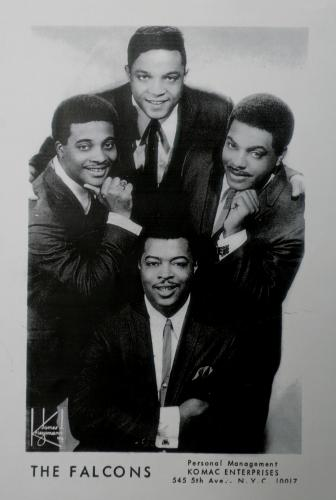
The Falcons still active in Detroit today
D'Y-Ann Marie Mathis (from the Debonaires).
"I dated Stevie Wonder for two years in High School".
D'Y-Ann Marie Mathis was singing with The Debonaires on classics songs by them we all have danced, listened and enjoyed lots of times. "How's your new love treating you" and "Loving you takes all of my time" are recordings she was on being only 15 years old. "I audiotioned when I was 15. They were looking for a lead vocalist for a gig and I stayed with them. I was very young but my step mother had saw my talent and used to put me in talent shows all around Detroit. That was my introduction to the Detroit sixties scene".
She had always wanted to be in the music business and she remembers that "I knew from childhood that I wanted to be a singer, dancer or actress. The Mickey Mouse Club was my everyday entertainment which made me know that music was my world. Later came my inspirations, singers like Nina Simone, Stevie Wonder or Nancy Wilson. I always enjoyed Sam and Dave, Marvin Gaye, the Temptations or Chuck Jackson because they were real entertainers and they kept you listening".
The name Stevie Wonder has to be special for D'Y-Ann Marie Mathis because she reveals that "I knew him and I dated him for two years in High School".
The Debonaires split, D'Y-Ann Marie Mathis remembers, because "everyone had married and we all went our separate ways, yet we all remain good friends to this day".
A young singer like her was working at United Studios when they were recording the cream of the Detroit soul scene. Her memories about the packed at every hour United Studios are very fond. "The Studio was always jumping, the excitement was incredible 24 hours a day. As soon as school was over, I went running at the Studio just to be in the excitement. Sometimes I was lucky to be in a session. The competition all the musicians and singers had was extremely wonderful. In fact, there was, and still there is, so much talent in Detroit undiscovered...".

She sang at the best Detroit clubs of the time, like The 20 Grand, the Chit Chat Lounge or Baker's Lounge. But one of them was special. "The Arcadia Skating, because every Easter we sang there with several stars and it was an extravaganza and very entertaining".
We mention that there are fans who still love songs like "How's your new love treating you" and she tells us that "it's marvelous they love the song. It was really a hit but we just did not get paid for our talent back then and it's a shame. It's still popular and the Debonaires never received the proper accolades for the success of the song".
In the seventies, D'Y-Ann Marie Mathis was on the road with The Undisputed Truth and various other Detroit groups. Now she works with an 8 piece orchestra and does gospel every Sunday with her professional choir, called The Gospel Truth.
"I have a CD out now I sell through my store at church and I'm working on a new CD. I hope to get some air play. I'll always sing as long as I have the wealth and I still sound good. God's been good".
Calvin "Dhaakk" Stephenson (from the Magictones).
"I mixed "Together we shall overcome" the day Martin Luther King was shot".
Calvin "Dhaakk" Stephenson was the falsetto voice of the Magictones, the MAH's and WHEELSVILLE records band, and he is the responsible for one of the great songs of the band: "Together we shall overcome", a song written in 1968 during turbulent times for the black population in the States.
His memories about the song are clear: "It was written for the Movement of the time, for the Freedom Movement. That's why we said that together we shall overcome. It was a together thing, no one person could effect that big change alone! So, unity and together we shall overcome was the message".
"The song was written and recorded before Dr. King was murdered, but the day he got shot I went to United Sound Studios and mixed the tape down. Then, Mike Hanks and I took it to the press. It came out the next day! It was all very fast. Coachmen Record Shop played over their outside speakers and it began to sell. I was the dominant lead singer of "Together we shall overcome" and, yes, as you will think, Curtis Mayfield strongly influenced my falsetto, that I discovered singing in church choirs".
But it was a long way for Calvin to being able to mix a song on a studio. "I was a foster child in the Children Aid Society. I was placed into two foster homes which were, if you will, musical homes. The first musical home, my mother Mathie Henderson nutured me as a toddler 2 or 3 years old. She was a singer. She sung in a group of women singers at the church choir. I was very young but I remember. She sung to us, my brother Herman and myself. She also took us with her and we traveled by streetcar to different programs that her group sung".
"The second foster home, Chandler and Marietta, was also a musical home. Marietta sung soprano in a church choir and my sister Evelyn played and taught classical music. She also played for a local church in Inkster. So we could say that my early association with music was at home".
He followed rhythm and blues and doo-wop while at high school. "Then, I realized I could sing other types of music, like The Moonglows, Flamingos, Midnighters, Drifters, Cadillacs. And, later, The Impressions with Curtis Mayfield (mentor) or Dionne Warwick and many others".
Calvin "Dhaakk" Stephenson formed The Magictones with four other friends who lived in Inkster. They were James Shackleford (bass singer), Richard Allen (tenor), Arthur Cartwright (tenor), Albert Singleterry (baritone). Later, Charles Wilson (bass) replaced James Shackleford. The name was and obviuos choice. "We all name the group because the harmony was so tight!", Calvin Stephenson says with pride.
More personnel changes were to come. All of the above singers quit close to High School graduation time. The bass singer Richard Thompson encouraged Calvin to start a new group and they did. The new members were Clarence Finch, Willie Allison, Bull Allison, Richard Thompson and Calvin "Doc" Stephenson.
The female singer of later times was Virginia Macdonald. She replaced Paul Willis, another member who had a brain tumor that killed him. Later, Virginia Macdonald would sing for Norman Whitfield as producer and with Undisputed Truth.
One of the early records of the band is named to Debra Healy & Magictones ("Don't do nothin I wouldnt do"), on the Chrysley label. "Debra Healy was a school mate. We were all members of Inkster High School Glee Club. She sang on "I can't erase my old love's face", on A side. To make it clear, nobody in the group went with Debra. She already had a boyfriend at the time".
They were signed to Mike Hanks and his MAH's recording label because "William Garrett introduced us to Mike Hanks because he got snuffed with the first two Magic Tone productions, "I can't erase my old love's face" and "See saw". So, we went to someone who was also established other than Motown, so we went to D-Town Records. D-Town was owned by Mike Hanks, Roger Brown and Pete Hall, ex-husband of Martha Jean, the Queen DJ".
Calvin "Dhaakk" Stephenson remembers Mike Hanks as a "funny guy fueled with the aspiration to be big as Motown and Berry Gordy. He was always trying to out do Motown, and did often".
We all know that Mike Hanks recordings were made at a building called Pig-Pen. He explains us that "the studio was built in a house. It belonged to Mike Hanks and was built by long head Sam Hall, engineer and bass player. That's where "Got to get a little closer" was recorded".
Is it true that the building was so close to the road that when you were recording there, you had to wait until the traffic passed? Calvin laughs and admits that story it's true. "But later it was sound proofed, so everything was right. The studio was on McGraw street. Nothing stands there now. It's a slum now".
I once read that if anyone hated Berry Gordy, Mike Hanks was one, because Mike Hanks paid a deposit on a building yards away from Motowns Hitsville and Berry bought ir right from under him.
We ask Calvin "Dhaakk" Stephenson if that's a true story, but he denies it. "He didn't hate Berry. In fact, he had a lot of respect for Berry for he emulated him with his music. And Mike's place, D-Town records, was located about a mile from Motown on E. Grand Blvd/John-R, so...".
The recent discovery of the Solid Hit missing ref. number 108, credited to the Magictones with "Fun to be young/It's better to love" is now on my mind. I ask Calvin "Dhaakk" Stephenson if he knows about the copy that surfaced recently of that Magictones single on the Solid Hit record label. The songs were issued originally on the Mah's label. We ask if he knows something about it. But no, he has no explanation for the record having been issued in Solid Hit also.
In the seventies, Calvin "Dhaakk" Stephenson joined The Undisputed Truth. He explains that "in fact, the whole Magictones joined or merged with The Undisputed Truth because we had helped Joe Harris complete the "Down to Earth" album. It sounded good, so we decided to merge together. We did four albums together, three on the Gordy label and one on the Whitfield label. We recorded in the Hollywood studio".
At the later Magictones line up, the one that made the records at Westbound, there were two singers called Tyrone: Tyrone Barkley and Tyrone Douglas, and were know as "Big Ty" and "Little Ty"." Who was "Big" and who was "Little"? Calvin Stephenson clears that Tyrone Douglass was big Ty, as he was 6'1, and Ty Barkley was Little Ty, as he was about 5'6.
Calvin "Dhaakk" Stephenson is full of energy nowadays, preaching and writing. He does recordings at his home and he is building a catalogue. His wife, Charnissa, is also a dynamic singer and writer too, so they work together. "We both sing very well and are experienced alone and or as a team. We intend to release our music, my sermons and other writings on the Internet".
Note: We've seen his name as Calvin "Doc" Stephenson and as Calvin "Dhaakk" Stephenson. He picked up the Doc nickname from his good friend Venus Vesey when he was 10 years old, but he changed the spelling from slave name Doc to Dhaakk in the early 70's, as he explained.
Barbara Mercer.
"I'm extremely happy and surprised that after all these years the collectors still appreciate "Call on me".
Barbara Mercer is another artist very active in the Music Society of Detroit. He began singing at the choir at John J. Pershing High School in Detroit, where she met Gino Washington. "Gino's humor was infectious. He kept our choir in High School laughing. My, my was he witty. I have not seen Gino in years".
Some years later, she explains that "George McGregor took me to Golden World. He didn't record me early. I was introduced to Mike Terry and we began working on "Hey". Then, I was introduced to Richard Popcorn, because writers and producers were coming from everywhere. I think Gene Redd and Helen Miller introduced me to "Doin' things together with you" and "The things we do together". I was so thrilled to be recording that my head was in the clouds most of the time. The Hamilton Brothers, Bobby, Al Kent and Chico, who were my neighbors, made a great contribution to Golden World".
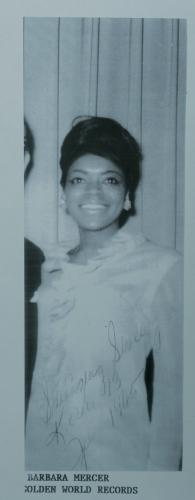
The next step was Sidra Records. "George McGregor and I went to Sidra after we left Golden World and George finally cut something on me that was released, it was "Call on me" and "So real". Let's ask Barbara to compare the Sidra "Call on me" and the Capitol one and she chooses the cut for Capitol. "The Capitol version was only a different mix. I liked the Capitol version better".
The other song she cut at Sidra was "So real", and she explains that "is the story of my evolution from when I first met George McGregor in August 1962. The day of the recording, we had the top of the line musicians, even the Detroit Symphony Strings. What a soul stirring experience. I was in the ether somewhere. I finally returned to Earth about it ten years later".
She does not remember cutting more songs at Sidra. I also ask her about other Sidra artists like Ronnie & Robyn or the Embraceables but she has no relation with them. "I was always on the road or stranded on the road in those days. I learned some of lifes' most valuable lessons while stranded on the road".
At Sidra, one of the important points was the choreography lessons that Brian Stone gave her and The Precisions. "Brian Stone was fantastic. He taught The Precisions and myself stage presence because he was extremely talented".
I explain her that there are people in Europe who still appreciate "Call on me" and her reaction is emotional. "I'm extremely happy and surprised that after all these years the collectors still appreciate "Call on me". I'm floored, amazed. It's almost unbelievable".
One of the best memories Mrs. Mercer keeps of the sixties is her tour with Arthur "Sweet soul music" Conley. "I left with Arthur Conley in September of 1968 to do series of one nighters for three months. The first night was Chicago at the Regal Theatre with Wilson Pickett. From that time on we played the chittlin circuit, colleges, holes in the wall, night clubs, military schools. The most memorable time with Arthur was in Miami and the Bahamas. Where is Arthur now?".
We leave Barbara with her son, Kareem, and her three angels, as she calls them, her three grandchildren: India, Shantell and Kammari.
Joey Kingfish
"I'm still active, writing, arranging, producing and performing vocally and instrumentally.
Joey "Kingfish" Stribbling got his nickname by imitating Kingfish (George Stevens) from the old "Amos & Andy" TV show. He quit school at 16 and began playing guitar. "My inspirations were Henry Mancini, Jimmy Smith and Kenny Burrell. And my favourite singers were Bobby Bland, BB King, Arthur Prysock, Roy Hamilton, Chuck Jackson. Each one had a distinctive sound", he tells.
He started playing in different clubs as the 20 Grand, Lee's Sensation, Hobby Bar, Sportman's Lounge and the Webbwood Inn. But his start was The Parker Trio, that consisted in himself on guitar, Melvin Davis on drums, Tony Newton on bass and David Ruffin on lead vocals as a training for his later Temptations days. Steve Mancha would replace Tony Newton. The band was together four years and appeared at all the major Detroit clubs like the Ebony Club or The Black Velvet Lounge.
I ask him how did he met David Ruffin and it seems Andre Williams, of "Bacon fat" fame, put them all in touch. Joey Kingfish remembers that "Andre Williams, who got me signed with Motown, where I met Billy Davis from the Five Keys and The Flamingos. It was him who introduced me to David Ruffin".
"David Ruffin was playful and talented. He played drums then with us and he had a great sense of humor. Years later, we kept our relationship and we played together at the Holiday Inn in Highland Park".
It's obvious to ask Joey Kingfish about the problems David Ruffin had with Berry Gordy, that lead him out the Temptations. Kingfish thinks that "David felt the group should have been called "David Ruffin and the Temptations", which caused big problems with Gordy".
His starting point at Thelma Records was a gig he had with Don Davis. "I was playing at The Frolic and I set in with the Don Davis Trio. Then, Don invited me to Thelma Records to work with the artists on sessions and vocal training. I found the atmosphere at Thelma Records was exciting".
Rose Battiste was one of the artists at Thelma and Joey remembers that "she was a good singer, but being immature, she had a tendency to overact from being too emotional".
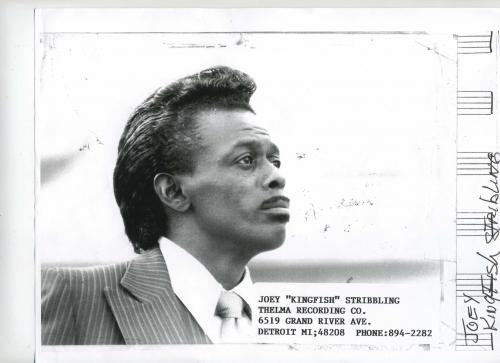
"I can hear you crying" was one of Kingfish's songs that were recorded for Eddie Hill at Ge Ge, Thelma's subsidiary. "It was written for my wife and "You got the best of me" was written for another ladyfriend of mine".
Things changed a lot in the Detroit music scene during the 70's and he blames disco music. "Disco killed the bar business and musicians were no longer hired because the clubs were hiring dj's".
What about the copyrights matter? "I received no copyrights", he is sad to admit, "but the Music Society is working to straighten the situation out. It's funny, but with all the work that I've done over the years, I've never been paid".
At least, he could keep his own records as a memory but he tells that, sadly, he lost then in a fire three years ago.
Joey leaves us with a clear statement: "I'm still active, writing, arranging, producing and performing vocally and instrumentally. I believe that with my fans in England and in Europe I can still reach my goal of performing for an international audience".
site note
Many Thanks to Alex for this great article, it written in 2004 and was originally published in the June 2006 Issue of the fine mag "Shades of Soul"


Recommended Comments
There are no comments to display.
Get involved with Soul Source
Add your comments now
Join Soul Source
A free & easy soul music affair!
Join Soul Source now!Log in to Soul Source
Jump right back in!
Log in now!